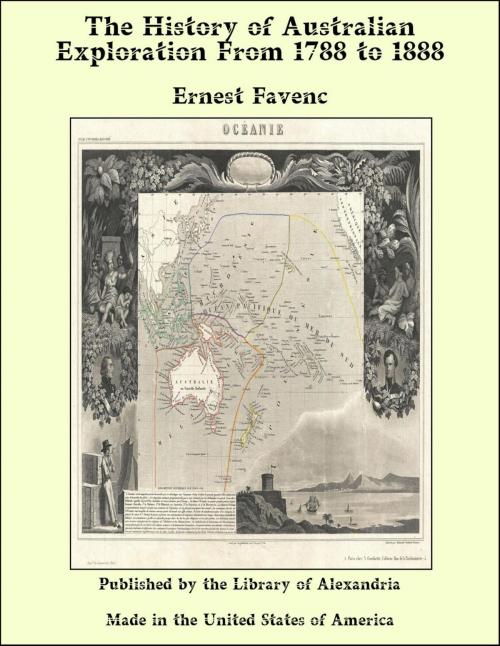The History of Australian Exploration From 1788 to 1888
Nonfiction, Religion & Spirituality, New Age, History, Fiction & Literature| Author: | Ernest Favenc | ISBN: | 9781465576378 |
| Publisher: | Library of Alexandria | Publication: | March 8, 2015 |
| Imprint: | Language: | English |
| Author: | Ernest Favenc |
| ISBN: | 9781465576378 |
| Publisher: | Library of Alexandria |
| Publication: | March 8, 2015 |
| Imprint: | |
| Language: | English |
A complete history of the exploration of Australia will never be written. The story of the settlement of our continent is necessarily so intermixed with the results of private travels and adventures, that all the historian can do is to follow out the career of the public expeditions, and those of private origin which extended to such a distance, and embraced such important discoveries, as to render the results matters of national history. That private individuals have done the bulk of the detail work there is no denying; but that work, although every whit as useful to the community as the more brilliant exploits that carried with them the publicity of Government patronage, has not found the same careful preservation. To find the material to write such a history would necessitate the work of a lifetime, and the co-operation of hundreds of old colonists; and, when written, it would inevitably, from the nature of the subject, prove most monotonous reading, and fill, I am afraid to think, how many volumes. The reader has but to consider the immense area of country now under pastoral occupation, and to remember that each countless subordinate river and tributary creek was the result of some extended research of the pioneer squatter, to realise this. Since the hope of finding an inland sea, or main central range, vanished for ever, the explorer cannot hope to discover anything much more exciting or interesting than country fitted for human habitation. The attributes of the native tribes are very similar throughout. Since the day when Captain Phillip and his little band settled down here and tried to gain the friendship of the aboriginal, no startling difference has been found in him throughout the continent. As he was when Dampier came to our shores, so is he now in the yet untrodden parts of Australia, and the explorer knows that from him he can only gain but a hazardous and uncertain tale of what lies beyond. But, in this utter want of knowledge of the country to be explored, where even the physical laws do not assimilate with those of other continents, lies the great charm of Australian exploration. It is the spectacle of one man pitted against the whole force of nature—not the equal struggle of two human antagonists, but the old fable of the subtle dwarf and the self-confident giant.
A complete history of the exploration of Australia will never be written. The story of the settlement of our continent is necessarily so intermixed with the results of private travels and adventures, that all the historian can do is to follow out the career of the public expeditions, and those of private origin which extended to such a distance, and embraced such important discoveries, as to render the results matters of national history. That private individuals have done the bulk of the detail work there is no denying; but that work, although every whit as useful to the community as the more brilliant exploits that carried with them the publicity of Government patronage, has not found the same careful preservation. To find the material to write such a history would necessitate the work of a lifetime, and the co-operation of hundreds of old colonists; and, when written, it would inevitably, from the nature of the subject, prove most monotonous reading, and fill, I am afraid to think, how many volumes. The reader has but to consider the immense area of country now under pastoral occupation, and to remember that each countless subordinate river and tributary creek was the result of some extended research of the pioneer squatter, to realise this. Since the hope of finding an inland sea, or main central range, vanished for ever, the explorer cannot hope to discover anything much more exciting or interesting than country fitted for human habitation. The attributes of the native tribes are very similar throughout. Since the day when Captain Phillip and his little band settled down here and tried to gain the friendship of the aboriginal, no startling difference has been found in him throughout the continent. As he was when Dampier came to our shores, so is he now in the yet untrodden parts of Australia, and the explorer knows that from him he can only gain but a hazardous and uncertain tale of what lies beyond. But, in this utter want of knowledge of the country to be explored, where even the physical laws do not assimilate with those of other continents, lies the great charm of Australian exploration. It is the spectacle of one man pitted against the whole force of nature—not the equal struggle of two human antagonists, but the old fable of the subtle dwarf and the self-confident giant.















